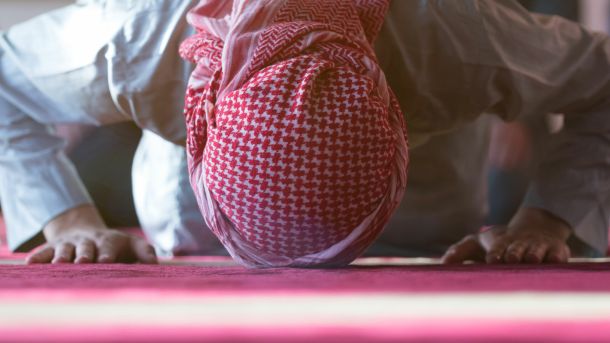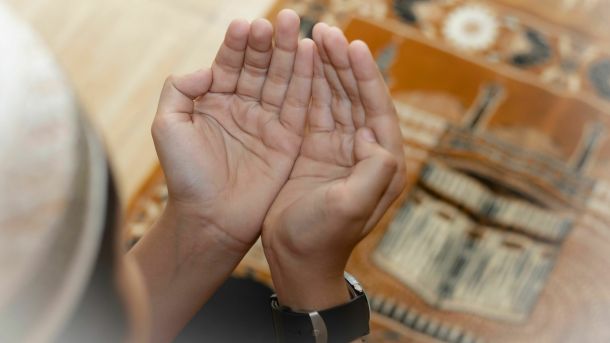News Archive
Mar 7, 2024
A Simple Guide to Allāh’s Perfect Names and Lofty Attributes
Al-Ghani (الغني): The Rich; Free of all Wants
Allāh—the Most High—said:
يَا أَيُّهَا النَّاسُ أَنتُمُ الْفُقَرَاءُ إِلَى اللَّهِ ۖ وَاللَّهُ هُوَ الْغَنِيُّ الْحَمِيدُ
“O mankind! It is you who stand in need of Allāh, but Allāh is Rich (free of all wants and needs), worthy of all praise.”
(Fāṭir, 35:15)
He—the Most High—is al-Ghani: The One who has complete and encompassing richness, in every conceivable way. This is because of His complete perfection and the perfection of His attributes such that no form or manner of deficiency may be associated with Him. He could not be except in a state of…
Feb 29, 2024
New Muslims Who May Not Be Able to Pronounce Arabic in Prayer
[Q]: If a person is not able to speak Arabic or pronounce its words, what should he do when praying ṣalāh?1
[A]: We have a judicial principle concerning which Allāh says:
لَا يُكَلِّفُ اللَّهُ نَفْسًا إِلَّا وُسْعَهَا
“Allāh burdens not a person beyond his scope.”
(Al-Baqarah, 2: 286)
The Most High also said:
فَاتَّقُوا اللَّهَ مَا اسْتَطَعْتُمْ
“So keep your duty to Allāh and fear Him as much as you can.”
(Al-Taghābun, 64:16)
And the Prophet (صلى الله عليه وسلم) said: “If I command you with an act, then perform it to the best of your abilities”.2 In consideration of these evidences, this pe…
Feb 29, 2024
Raising the Hands in Ṣalāh (Rafʿ al-Yadayn)
Applicable Positions of Raising the Hands in Ṣalāh and Its Evidence
One should raise their hands while saying the takbīr in ṣalāh. The evidence for this is that raising the hands when saying the takbīr was narrated in several aḥādīth from the Sunnah. Among them is the ḥadīth of Ibn ʿUmar (رضي الله عنهما): “The Prophet (صلى الله عليه وسلم) used to raise his hands until they were adjacent to his shoulders. He would do so when beginning the ṣalāh, when saying the takbīr for rukūʿ, and when raising his head from rukūʿ.1 It was also authentically narrated that he (صلى الله عليه وسلم) would raise t…
Feb 29, 2024
The Evil Implications of the Ikhwānī Slogan:“We Cooperate with One Another Regarding That Which We Agree Upon, and Forgive One Another in That Which We Differ Concerning.”
[Q]: What are the true implications of the phrase: “We cooperate with one another regarding that which we agree upon, and forgive one another in that which we differ concerning.”
Shaykh Nāṣir al-Dīn al-Albānī [d. 1420 AH] answers:
[A]: Yes, some of the callers to the religion of Islām repeat this phrase often. Our opinion regarding them is that they are general callers to the religion of Islām—general Islām.
As for the callers to Islām whose point of reference is the Book of Allāh and the Sunnah, upon the methodology of the pious predecessors—we do not know of a group that calls to this wa…
Feb 29, 2024
Articulating Specific Intentions for Specific Prayers
The Opinion of the Ḥanbalī Madh`hab
According to the Ḥanbalī madh`hab, one must hold an intention for every ṣalāh performed. That is, whoever wishes to pray should hold an intention to pray the specific ṣalāh he is about to perform. For example, if a person wishes to pray Ẓuhr, he must hold the intention for Ẓuhr ṣalāh. Likewise, if he wishes to pray Fajr, he must intend to pray ṣalāh al-Fajr. If he wishes to pray witr, he must intend to pray ṣalāh al-Witr. If he intends to pray supererogatory prayers, then it is sufficient for him to simply intend to pray without specification of any particu…
Feb 29, 2024
The Ruling on Men Wearing Dark Red Coloured Clothing (and Clothing that Specifically Resembles the Disbelievers)
It is considered disliked for men to wear safflower-red or saffron-crimson [darker shade of red] clothing. This dislike should be interpreted as one of avoidance (tanzīh). We must acknowledge, here, that if the contemporary jurists use the word ‘disliked’, they are referring to that which is better avoided, rather than an action that is disliked to the extent that it is completely ḥarām.
‘Crimson’, here, refers to that which is dyed with saffron. ‘Red’ refers to that which is dyed with safflower. Both of these colours are disliked for males. The evidence of this is that the Prophet (صلى الله…
Feb 29, 2024
The Intention When Leading Prayer or Being Led in Prayer
Both leading the ṣalāh and being led [in ṣalāh] are actions that require intention. This is because congregation is considered an additional circumstance to the fundamental action of ṣalāh. For this reason, we say: The intention of praying in congregation is obligatory prior to starting the performance of congregational prayer, it is not simply achieved by praying it. Thus, does this [additional] circumstance [of leading others or being led] require a specific intention, or would it be sufficient for a person to simply follow the actions of another? The answer to this is provided by our state…
Feb 29, 2024
The Creation Intends to Benefit from You While Allāh Seeks Only Your Benefit
On the authority of Abū Dharr (رضي الله عنه): The Prophet (صلى الله عليه وسلم) narrated from his Lord—the Exalted in Might: “O my servants! You shall never be able to benefit me in any way, nor will you ever be able to harm me in any way. O my servants! It is only your deeds which I enumerate for you. Then, I recompense you in consideration of them. So whomever is recompensed with goodness, let him praise Allāh. Whomever encounters other than that, let him blame none but himself.”
Narrated by Muslim: 2577
Imām Ibn al-Qayyim comments:
The creation does not intend to cause you benefit in the…
Feb 29, 2024
Seeking Refuge in Allāh from the Challenges of Life Using the Encompassing Speech of the Prophet (ﷺ)
In an authentic ḥadīth: the Prophet (صلى الله عليه وسلم) used to say:
اللَّهُمَّ إِنِّي أَعُوذُ بِكَ مِنَ الْهَمِّ وَالْحَزَن، وَالْعَجْزِ وَالْكَسَل، وَالْجُبْنِ وَالْبُخْل، وَضَلَعِ الدَّيْن، وَغَلَبَةِ الرِّجَال
“O Allāh! I seek refuge in You from stress and sadness, inability and laziness, cowardice and selfishness, the rigours and severity of being in debt, and being subjugated to the command and whims of men.”1
Imām Ibn al-Qayyim comments:
He (صلى الله عليه وسلم) sought refuge from eight things, every two of them are associated with one another.
Stress and sadness accompany one anothe…








